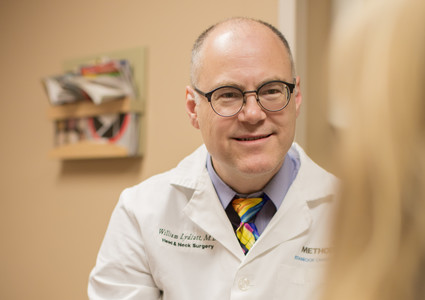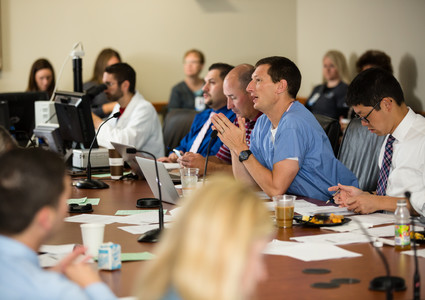Cancer Care
Life After Head and Neck Cancer Surgery: Finding a 'New Normal'
Impact of head and neck surgery
When faced with the reality of having cancer, your first thought is often, “cut it out.” But when it’s cancer of the head and neck, you’re talking about an area with a lot of what I call “high-end real estate.”
Surgery for cancers of the head and neck can impact the way we look, talk and taste and smell things – even how we eat and breathe. As a head and neck surgical oncologist, I am focused on not only removing the cancer, but also making life after cancer as normal as possible. It’s also my job to prepare you for that “new normal.”
Preparing for head and neck surgery
It’s important to face any life-changing surgery with a realistic expectation of the possible outcomes.
 Before surgery, I speak very frankly with my patients, letting them know we're not necessarily going to rebuild things the way they were before the cancer. Things may never completely be the same. I try to give my patients that information as far enough in advance as possible to help them mentally process the change.
Before surgery, I speak very frankly with my patients, letting them know we're not necessarily going to rebuild things the way they were before the cancer. Things may never completely be the same. I try to give my patients that information as far enough in advance as possible to help them mentally process the change.
For example, life after a tracheostomy is very different than breathing out of your mouth or nose. I talk to my patients about that difference, provide them with educational information and give them a visual idea of what to expect. It helps patients wrap their minds around what’s about to happen with their bodies.
In many ways, I don’t think patients can truly ever be prepared for what they're about to experience. I believe in being realistic – not giving false hope but sharing real information about what positives and negatives to expect. If you give patients information saying, “This could be how it is,” but then the outcome is better, they're in a much better place emotionally and psychologically. And I think that's a huge component that helps them in the journey of recovery.
Restoring look and function
Sometimes in head and neck surgery, it’s necessary to move tissue around to rebuild the structure which must be removed with the tumor. Depending on where the cancer took hold, that could include the tongue, the jaw or an area of bone around the eye socket.
 Cutting out cancers that affect these or other key areas will obviously affect the way you look and function. It’s our job to make sure that you understand the surgery and recovery process, and that every question you have is answered. Our team is there to help rebuild and rehabilitate.
Cutting out cancers that affect these or other key areas will obviously affect the way you look and function. It’s our job to make sure that you understand the surgery and recovery process, and that every question you have is answered. Our team is there to help rebuild and rehabilitate.
Recovering from head and neck surgery
It’s also important for patients to know that after surgery, they won’t face recovery alone. As a surgeon, I am only one member of a very important team of providers taking care of a patient. Once we’re done with the acute surgical aspect, that team shares in ongoing treatment and care. Clinical staff is there to return every phone call and answer every question – whether I am physically present or not. They are members of a care community that lets patients know they are not facing cancer alone.
If you have questions about head and neck cancer surgery and recovery, contact the Methodist Estabrook Cancer Center Head and Neck Oncology Clinic at 402-354-5048 or the 24-hour hotline at 866-269-2878.


